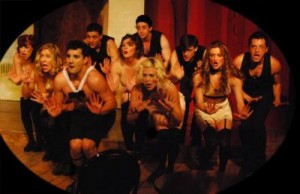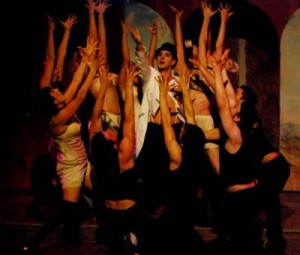
When Cabaret debuted on Broadway in 1966, its tale of star-crossed lovers in pre-WWII Berlin was dark stuff for New York audiences accustomed to considerably brighter shows like Hello Dolly, She Loves Me, and Mame. Still, that first incarnation of Cabaret was positively sunny compared to the 1998 revival which has set the tone for just about every Cabaret since then. Imagine a Cabaret without “Mein Herr,” “Maybe This Time,” or “I Don’t Care Much,” without Kit Kat Boys, without any suggestion of homosexuality, one with upbeat love songs like “Why Should I Wake Up?” or the Yiddish ditty “Meeskite.” That was Cabaret pre-1998 and one which might be a bit of a yawn by contemporary standards.
Well, yawning is most definitely not something you’ll be doing during Musical Theatre Of Los Angeles’ electric new production of Kander and Ebb’s musical theater classic. Directed with originality and flair by Judy Norton, with choreographer Tania Possick’s racy dance sequences burning up the Met Theatre floor, this is one of the sexiest, rawest, darkest, and most entertaining Cabarets L.A. has seen.
As musical theater aficionados will tell you, Cabaret is based on Christopher Isherwood’s Berlin Stories, which recount the then 25-year-old British medical student’s stay in the sex-and-sin capital of Europe. As Wikipedia relates, “rejecting his upper-class background and attracted to males, (Isherwood) remained in Berlin, the capital of the young Weimar Republic, drawn by its deserved reputation for sexual freedom. There, he fully indulged his taste for pretty youths. He went to Berlin in search of boys and found one called Heinz, who became his first great love.”
Clearly, Isherwood’s real-life adventures would have been more than a tad too gay for mid-60s Broadway, and even today’s Cabaret centers around its hero Clifford Bradshaw’s very heterosexual love affair with Brit expatriate slash night club entertainer Sally Bowles. Still, this Cliff has a past (as a particularly steamy early reunion with one-time lover Bobby reveals), and this Berlin is clearly a place where people of just about any orientation could find a way to express their sexuality openly and freely—something which audiences discover from the moment they enter the Met.
Scantily clad Kit Kat Girls and Boys roam the stage-level nightclub tables and the seats above, chatting, flirting, and taking drink orders from Kit Kat Club “customers,” as musical director Greg Haake and his sensational onstage band provide just the right atmosphere to transport theatergoers to decadent 1930s Berlin.
Playing against romantic hero type, his powdered, eye-lined face giving him a sexy, androgynous air, Emcee Eduardo Enrikez launches into Cabaret’s signature opening number, Willkommen, a show-stopping performance which sets the tone for the rest of the evening.
Director Norton deliberately and effectively blurs the lines between cabaret sequences and real life from the get-go, with Kit Kat Boys moving a few chairs around to transform the night club into the train compartment where Cliff Bradshaw (Michael Bernardi) makes the acquaintance of Ernst Ludwig (Craig Bachmann), the handsome Berliner who will introduce him to the city’s nightlife. First, though, Ernst escorts Cliff to the boarding house of Frau Schneider (AnnaLisa Erickson), whose song “So What” expresses the been-there-done-that Frau’s “who cares” philosophy of life.
It’s not long before Frau Scheinder’s digs have morphed back into the Kit Kat Club where Sally Bowles (Kalinda Gray) cautions club-goers “Don’t Tell Mama,” backed by her sizzling sextet of Kit Kat Girls and her hunky quartet of boys. Cliff, seated at a table among Kit Kat Club regulars (=Met theater patrons) gets a call at his table phone from Sally, who introduces herself to the handsome American (“Perfectly Marvelous”), and before you know it, the “Toast Of Mayfair” has arrived at Cliff’s room, suitcase in hand, and the two expats are shacking up together.
It’s only a matter of time before Cliff and Sally have become lovers, and since we’ve already seen Cliff in a liplock with Kit Kat Boy Bobby, this hetero twist in Cliff’s life comes as a bit of a surprise, though Cliff himself may be as taken aback as we are by this turn of events.
As Sally and Cliff become more intimately involved, so does Germany’s involvement with Nazism take deeper root, and Cliff begins to have second thoughts about earning extra Deutschemarks as an amateur courier for Ernst. Frau Schneider too begins to think twice about marrying her Jewish suitor, greengrocer Herr Schultz (Jayson Kraid), who had previously won her heart by gifting her with a pineapple (“It Couldn’t Please Me More”). Berlin, which had seemed to Cliff such a perfect antidote to staid old England, now shows itself to be a considerably darker, more dangerous place to live.
In the tradition of the great Emcees who have preceded him (Oscar & Tony winner Joel Grey and Tony-winner Alan Cumming), Enrikez is a larger than life stage presence, charismatic, seductive, and frightening all at once. The lovely Gray is completely convincing as the liberated English girl who swears to “go like Elsie,” living life to the fullest. While other Sallys may have had more powerful pipes, Gray still does justice to classic Sally numbers like “Maybe This Time” and “I Don’t Care Much,” and acts the hell out of the part. Bernardi too is absolutely real as Cliff, a gifted young actor with a dynamic stage presence, a sweet voice, and sex appeal to match Gray’s.
Bachmann is very good as Ernst, and Kraid sings Herr Schultz’s songs (particularly “Married”) beautifully. Josie Yount makes a strong impression as Fraulein Schneider’s “working girl” lodger Fraulein Kost, whose string of visiting “nephews” makes it clear precisely what kind of night job she has. Yount sings a gorgeous German-language version of “Married” as a poignant counterpoint to Kraid’s English-language performance.
Finally, among the leads, there is the superb work of Erickson, virtually reinventing the role of Fraulein Schneider. Many Schneiders are content simply to sing “So What.” Erickson sings, acts, AND dances the song, grabbing Cliff into her arms in a joyous impromptu waltz that makes her later resignation at breaking her engagement to Herr Schultz all the more sadly ironic. It’s a commanding triple-threat performance.
Opening night also featured terrific work by Kit Kat Girls and Boys Korken Alexander (Bobby), Annette Sintia Duran (Rosie), Aaron Jacobs (Hans), Leah McKendrick (Fritzie), Bonnie McMahan (Helga), Possick (Lulu), Jesse James Rice (Herman/Max), Brooke Seguin (Texas), Claudia Vasquez (Frenchie), and Danny Zaccagnino (Victor). The song “Tomorrow Belongs To Me,” customarily sung by a blonde, blue-eyed über-Aryan male teenager here goes to the talented young child actress Danielle Soibelman, rendering this Nazi hymn all the more chilling.
MTLA’s Cabaret more than maintains the level of excellence set by their previous productions of Ragtime and West Side Story. John Wright’s set design has been beautifully painted by Victoria Bellocq to reflect the influence of Paul Klee, one of the “Un-German” painters whose works were confiscated and sold by the Nazi party. Ann McMahan’s great period costumes run the gamut from skimpy Fredericks Of Hollywood style Kit Kat Girl outfits to 1930s streetwear to the Emcee’s decadent all-black costumes. Derrick McDaniel’s lighting design and Joseph “Sloe” Slawinski’s sound design are first rate as is Lori Haake’s makeup.
Director Norton deserves highest marks for keeping this production of Cabaret exciting and innovative. The final fadeout is the most startling of any I’ve seen and one that packs an huge emotional wallop. It’s a doozy of an ending to an all-around sensational evening of musical theater.
Met Theatre, 1089 N. Oxford, Hollywood.
www.plays411.com/cabaret
–Steven Stanley
June 19, 2009
Photos: Andrew Yount




 Since 2007, Steven Stanley's StageSceneLA.com has spotlighted the best in Southern California theater via reviews, interviews, and its annual StageSceneLA Scenies.
Since 2007, Steven Stanley's StageSceneLA.com has spotlighted the best in Southern California theater via reviews, interviews, and its annual StageSceneLA Scenies.







 COPYRIGHT 2024 STEVEN STANLEY :: DESIGN BY
COPYRIGHT 2024 STEVEN STANLEY :: DESIGN BY